10th, June 2019 | Oh Jinna
A Guide to Retinal Detachment Treatment
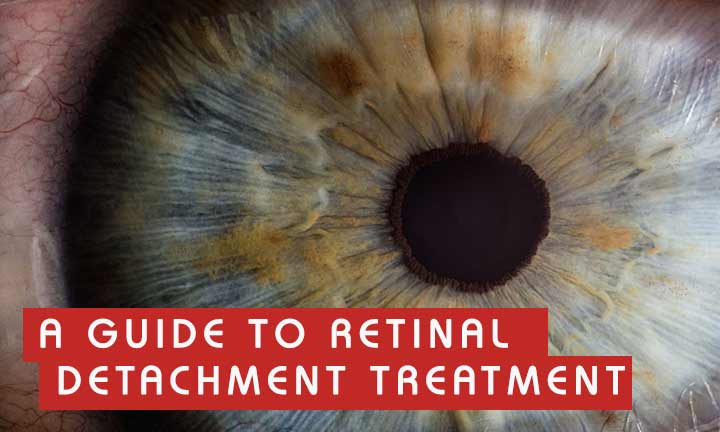
What is Retinal Detachment?
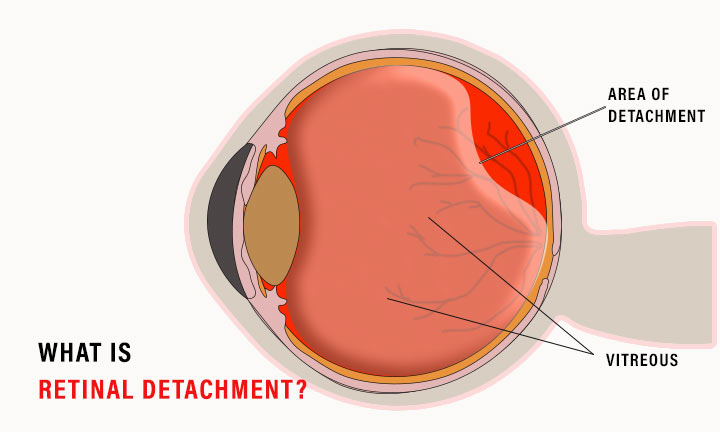
If you’re a fight fan or you’re in to extreme sports, you might already know about retinal detachment. In fact, it’s a type of eye injury that you’ll mostly hear from MMA fighters and boxers who undergo retinal detachment treatment. But this type of eye injury isn’t only reserved for adventurous action-loving people, everyone is prone to retinal detachment. Read on and learn about the causes, symptoms, and process of retinal detachment treatment.
Retinal detachment is so serious that you’re at risk of permanently losing your vision if you don’t have it treated for a long time.
Before we talk about retinal detachment treatment, let’s find out what retinal detachment actually is and how it affects your vision. There is a soft layer of tissue behind your eye that leads to retinal detachment if it is torn apart.
When your retinal cells separate from the blood vessels, you lose oxygen and nutrients that help maintain your vision. Retinal detachment is so serious that you’re at risk of permanently losing your vision if you don’t have it treated for a long time.
Common Symptoms of Retinal Detachment
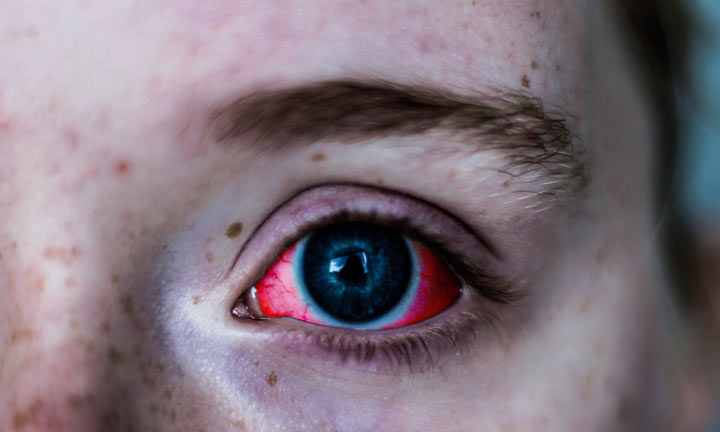
Retinal detachment can suddenly occur without prior warning signs, but this guide will help you identify the symptoms of this eye condition. Retinal detachment normally happens as you get older because your retina eventually gets thinner and weaker.
Although, a lot of people also get retinal detachment treatment because of injuries to the eye. Finally, since retinal detachment is a very serious condition you should have it checked and treated as soon as possible.
Avoid retinal detachment and other eye problems with these health tips: Good Habits To Preserve Your Eyesight Over Time.
So how do you know if your retina is detached? Would you feel it right away or would the pain be subtle?
Most of us ask these questions as soon as we learn about what retinal detachment really is. And to help put your mind at ease, here’s some of the symptoms that you’ll feel when you have retinal detachment.
Is your peripheral vision getting smaller?
Generally, our eyes have a wide field vision and the ability to focus on objects within that field. And the wide range of our eyesight is what we call our peripheral vision.
But when you have retinal detachment, the sides of your vision, also known as the peripheral vision, becomes limited. The lack of of visual range that you get with retinal detachment will only get worse over time, so you should get your eyes checked by a doctor immediately.
Do you see flashes of light?
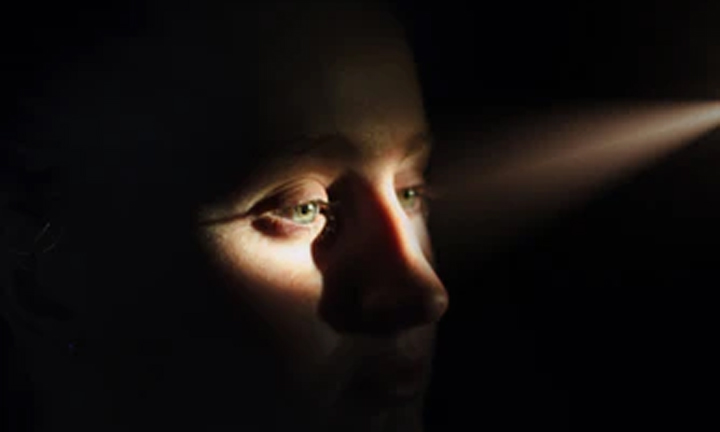
If you start to see flashes of light at the edge of your eye, then you are at risk of retinal detachment. The flashes of light start to appear when vitreous gel in the central part of your eye shrinks.
The “vitreous traction” or the pulling force of the vitreous happens at the corner of your eyesight.
Read on and keep your eyes healthy with these super foods: TOP 17 MOST BENEFICIAL SUPERFOODS TO MAINTAIN GOOD EYESIGHT.
Although this pulling motion of your retina is normal, there are rare occasions when it leads to the tearing of your retina. As a result, you end up with retinal detachment. If you constantly see flashes of light, you should get your eyes checked right away.
Do you notice more floaters in your vision?
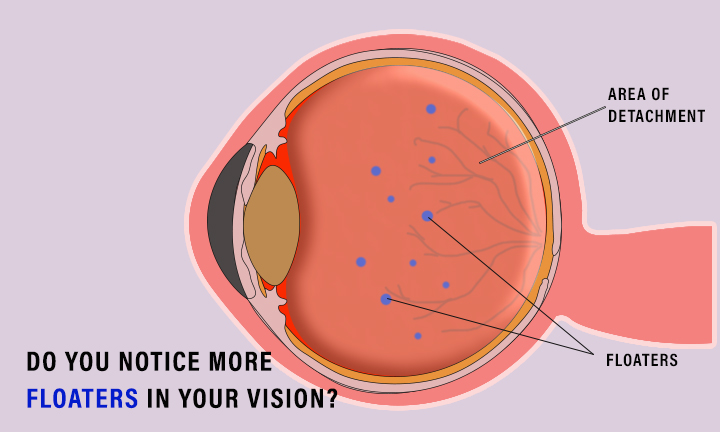
Do you notice weird specs or tiny strands that float around in your field of vision? The specs that you see are called “floaters” and you don’t really have to worry about them.
In fact, everyone has these floaters in their eyes, but they just aren’t noticeable most of the time.
However, a common retinal detachment symptom is when you suddenly see more floaters than usual. And you normally don’t see them, so when the floaters start to bother your vision, that’s a sign that something’s wrong with your eye.
So if you see more of them, you should definitely get your eyes checked right away.
Do you suffer from blurred vision?

A blurry vision isn’t something out of the ordinary. In fact, I’m sure we’ve all had instances when our vision gets a little blurry, especially after waking up or getting something in our eyes.
However, as harmless as it may seem, a blurry vision can also mean that your eyes may not be as healthy as you think.
Find out if you suffer from any of the common eye problems that we normally miss: 5 Common Eye Problems That We Usually Miss.
When you have retinal detachment, you’ll experience intense blurred eyesight out of nowhere. If you notice this symptom, you should get your eyes checked immediately for retinal detachment treatment.
Remember, retinal detachment is very serious and the lack of immediate medical attention can lead to permanent vision loss!
Is there a curtain or shadow over your field of vision?
There’s one more prominent retinal detachment symptom that you should really be aware of. And this one is particularly important because it isn’t something that you normally get with minor eye problems.
If you suspect that you need retinal detachment treatment, then you should see if curtain-like shadows appear in your field of vision.
This should seem as if a very thin drape of cloth is constantly hovering on the sides of your eyes. So if you see curtains on the sides of your vision, as well as any other mentioned symptoms, you should get your eyes checked.
Causes of Retinal Detachment
Before we talk about retinal detachment treatment, we should first be aware of the different causes of this eye problem. There are a number of reasons for you to get retinal detachment, and here are some causes that are at the top of our list.
Aging

It’s a well known fact that our health naturally declines as we get older. As a result, the gel substance that fills your eye eventually decreases and turns more liquid.
This substance is called vitreous and it can possibly pull on the retina which can cause retinal detachment.
Recurring Retinal Detachment
Retinal detachment can still occur even after surgical treatment. According to an article by the Service d’Opthtalmologie, the anatomical success of retinal detachment treatment is higher after two or more operations.
As a matter of fact, the article shows that the success rate after one operation is around 85 to 90 percent while the success rate is around 94 to 96 for more than one operation.
As a result, although your retina may still detach even after surgery, the quality of your retinal detachment treatment increases after another surgery.
Severe Myopia (Nearsightedness)

According to a study by the American Journal of Epidemiology, around 55 percent of nontraumatic retinal detachments are related to myopia.
Additionally, when compared to eyes without myopia, an myopic eyes with a spherical refractive error of negative 1 to negative 3 diopters are four times more prone to retinal detachment.
In conclusion, having a high myopia can mean more chances of retinal detachment.
Prevent eye strains and maintain a healthy vision with these tips: These Things Can Help You Prevent Eye Strain.
Past Eye Surgery or Eye Injury
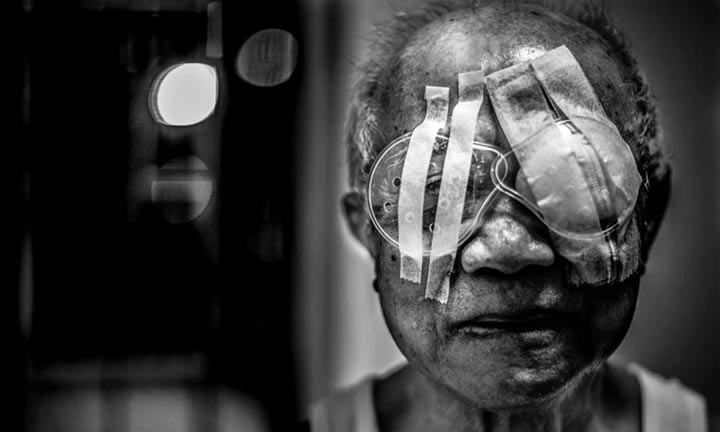
Old conditions with an eye can sometimes lead to new complications like retinal detachment. For example, a previous eye surgery can lead to retinal detachment due to unexpected complications.
Even old injuries that may have caused unnoticed eye damage can lead to retinal detachment in the long run. So you should never take your recovery for granted and always keep an eye out for retinal detachment symptoms.
Retinal Detachment Treatment for You
Surgery is the clear and definite way to fix retinal detachment. Whether it’s a tear, a hole, or a complete detachment of your retina, eye surgery is the retinal detachment treatment that you definitely need to get.
You should talk to a trusted ophthalmologist regarding the benefits as well as the risks of your options for retinal detachment treatment.
Treating Retinal Tears
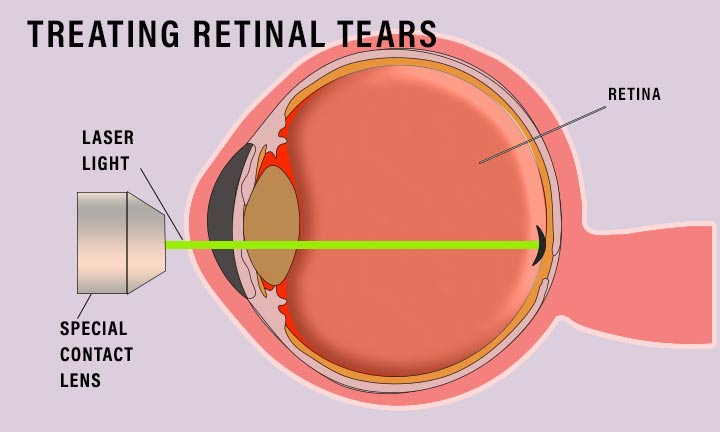
When you are at risk of retinal detachment due to a tear or a hole in your retina, your eye doctor will most likely suggest any of the following procedures as your retinal detachment treatment.
Laser Surgery
With photocoagulation or laser surgery, doctors use a laser to burn the tissue that surrounds the retinal tear which bonds the retina to the bottom tissues. This concept is very similar to welding metal together by using intense heat.
Freezing

With cryopexy or freezing, doctors place a freezing probe over your retinal tear which creates a scar that can help secure your retina.
These are outpatient procedures, so you won’t have to worry about staying in the hospital. However, you’ll be advised to wear protective lenses and avoid any dangerous activities for a meantime.
Treating Retinal Detachment
If your retina is fully detached, then a surgery is what you really need. In addition, there are different types of surgery according to the severity of your retinal detachment.
According to a study by the Ludwig Boltzmann Institute of Retinology and Biomicroscopic Laser Surgery, despite the different types of retinal detachment treatment procedures, the outcomes of these procedures are comparable and are a matter of trend and need.
Pneumatic Retinopexy
For this procedure, your doctor injects gas into the central area of your eye. The purpose of the bubble is to push the parts of the retina that have holes against the wall of your eye to stop fluid from flowing into the space at the back of your retina.
Doctors also utilize cryopexy to fix the detachment of your retina. The bubble will eventually disappear, however you will need to keep your eyes held to a specific position to keep the bubble in place before it is absorbed.
Scleral Buckling
This procedure involves making and indentation at the surface of your eye. A surgeon sews a silicone material to the white part of your eye that is above the damaged area.
This causes an indentation in your eye that helps relieve the pressure of the vitreous pulling on your retina. If you have multiple retinal tears or holes, your doctor will apply a scleral buckle that surrounds your eyeball. This acts like a permanent belt that helps with your retinal detachment.
Vitrectomy
With the vitrectomy procedure, doctors drain and replace the liquid in your affected eye. Surgery is required to remove the tissues that are pulling on your retina.
Then your doctors inject a substance to the space to flatten the retina of your eye. After some time, the substance in your eye will dissolve and the natural eye fluid refills the vitreous area.
Living With Retinal Detachment
You can lose certain degrees of vision when you have retinal detachment. That is why proper care and maintenance should be combined with a healthy lifestyle after your retinal detachment treatment. Here are a couple of tips that can help you cope with retinal detachment.
Protective Eyewear
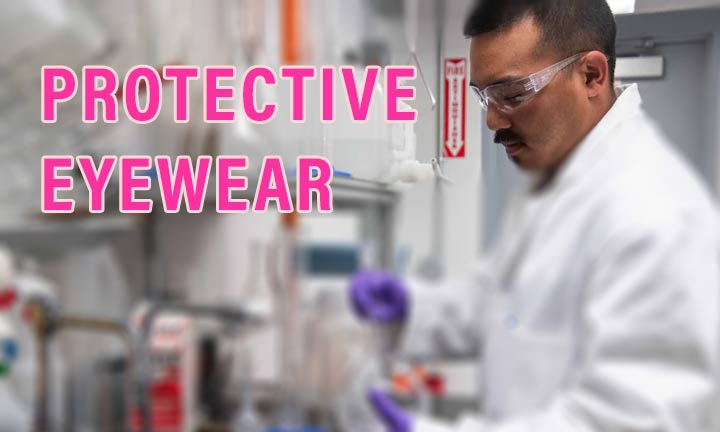
Sometimes our passions and hobbies can lead to certain health risks, especially when you have retinal problems to begin with. So if you’re into sports or outdoor activities, start by getting a pair of safety glasses to keep your eyes safe during intense activities. Although it would be safer to avoid dangerous activities all together.
Improve Your Home

Your vision needs a lot of time to recover after surgery and if you’re already suffering vision loss from a damaged retina, then keeping your house bright will really help with your poor vision. You can start by making sure that you’re rooms are properly lit especially for reading and moving around.
Another good home improvement is by avoiding rugs or any other material that can cause you to slip. You can also add some colored tape on staircases, steps, and sharp edges of your home so they are clearer to your vision. Remember, you should adjust your environment according to your vision.
Family & Friends

When you suffer from vision loss, you should never be ashamed to ask for help. The impairment can be difficult to accept and deal with at first, but it gets easier as long as you have people to talk to about your problems.
It also helps if you can ask friends and relatives to help you set up your home in a way that is convenient for your condition. This activity will help them understand the severity of your condition as well as help you be more independent in the long run.
Technological Aid

The rising trend of technological advancements allow gadgets like phones to help aid our visual impairments. If you’re into books, then you might want to consider downloading electronic books that you can listen to.
There are also computer screen readers that can help you read things on your screen. There are more innovative technologies out there just waiting to be discovered so don’t hesitate to ask around or do some research.
Support Group

Even though vision loss is primarily a physical challenge, you should not take its emotional impacts lightly. Dealing with vision loss can be emotionally stressful, especially if you are used to being very independent.
As hard as it may be, you should try to open up your challenges and fears to others. In fact, you’ll be surprised by the comfort and relief you get when you talk to people who have similar problems.
Connecting with people who face the same challenges as you can help you learn and grow, as well as share your own insights and experience to others.
Remember, retinal detachment can lead to vision loss so never take this condition lightly. If you see any of the symptoms, you should get your eyes checked as soon as possible.
And if you’re currently dealing with retinal detachment, just incorporate our advice along with your doctor’s instructions and you’ll be fine. Retinal detachment treatment is not easy, but it is worth it.
References:
Risk Factors for Recurrent Retinal Detachment
https://www.ncbi.nlm.nih.gov/pubmed/17978684
Retinal Detachment
https://www.mayoclinic.org/diseases-conditions/retinal-detachment/diagnosis-treatment/drc-20351348
Trends in primary retinal detachment surgery: results of a bicenter study

Leave a Reply
You must be logged in to post a comment.